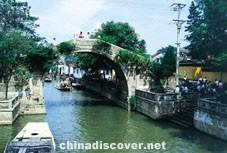
The Hanshan Temple in Suzhou is not only a charming historic temple, but a place of deep cultural resonance for people in China.
The temple is located on the edge of the modern city center, alongside the ancient Grand Canal and several ancient bridges which cross it.
The temple was founded over 1,500 years ago, but owes it fame to a a poem written in the Tang dynasty by Zhang Ji, a poet who traveling by boat through Suzhou. As his boat anchored in the canal near the temple one winter evening, the deep ringing of the temple bell in the winter darkness inspired him to write a poem which has become a classic throughout Asia:
"Moonfall. Crows cry in a sky full of frost. / Maple Bridge. Lamps of fishermen doze off in the gloom. Outside old Suzhou lies Hanshan Temple / At midnight, the sound of its bell reaches my boat."
The fame this poem brought to the temple drew in its wake many artists and intellectuals, who were inspired to write their own poems and calligraphy celebrating its charms. Today these classics are carved into stone and set into the temple's saffron walls, while inscribed stone monuments dot the courtyards and halls.
The poem has also made the temple's bell quite famous, and even inspired a group of 17th century Japanese pirates to steal the bell and take it back to Japan. The current bell was donated by Japanese citizens in the early 20th century to apologize for the theft of the original. Swinging a great wooden log against the bell to ring it is one of the highlights of many tourists' visits to Hanshan Temple. Once struck, the deep, solemn toll of the bell echoes through the temple courtyards.
Alongside the temple lies the Grand Canal and several more historic sights. An ancient bridge arched like a half moon crosses the canal opposite the temple's gate, while nearby sits a massive and imposing fortified gate and bridge.
Raids by Japanese pirates were endemic in the 17th century, and to defend themselves the residents of Suzhou constructed a bridge/fortress to keep the pirates at bay. It still stands today, its ancient stone walls draped with ivy. Climbing up the narrow spiral stairs to the battlements, your eyes move from the waters of the canal beneath and the busy traffic of heavily laden barges and skiffs over to the yellow halls and ancient green trees of Hanshan Temple, and finally to the buildings of modern Suzhou on the horizon.
New Year Bell Ringing Ceremony
The ancient Hanshan Temple in Suzhou is home to one of China's oldest and largest New Year's festivals. In traditional Chinese culture, the stroke of midnight is celebrated by ringing the great bells of Buddhist temples.
At Hanshan Temple an array of activities and performances have been arranged around the ringing to make it a fascinating and entertaining way to ring in the New Year!
First, there is a New Year's Eve feast at which there are performances of traditional music and dance. In the hours leading up to the ringing the temple takes on a festive air as people from Suzhou arrive to celebrate and see lion dancers and performers on stilts.
The ancient halls are lit by colorful dragon lanterns and decked with decorations evoking wishes for an auspicious New Year. From the main temple come the sounds of the assembled monks chanting Buddhist sutras, wreathed in thick, fragrant clouds of incensesmoke.
As midnight draws near, a lull of reverent silence falls over the crowds. Everyone listens respectfully as the bell is rung 108 times; its deep, solemn boom banishing the cares and troubles of the passing year. As the echo of the last stoke fades, the New Year begins amidst the lively crackle of countless firecrackers.
